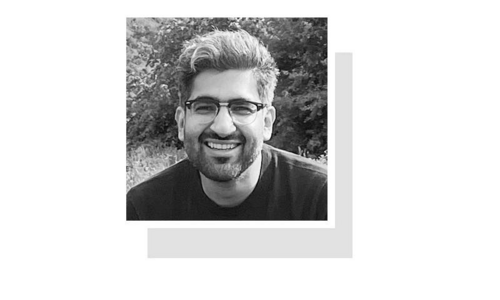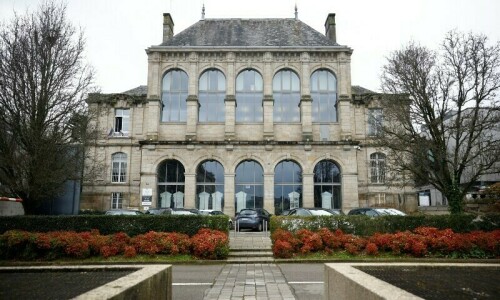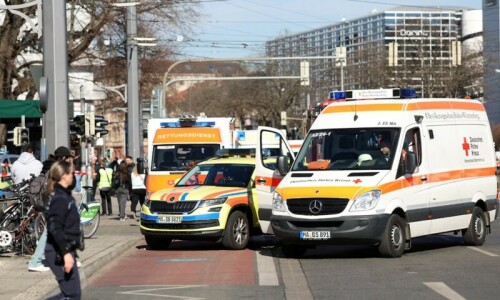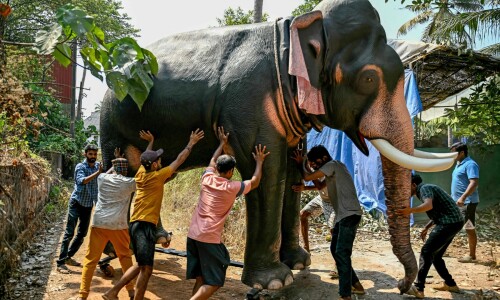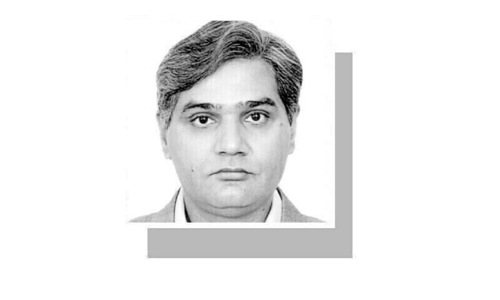IN the lead-up to yet another iteration of the Imran Khan vs Sharif brothers show on Nov 30, it is hard not to take notice of the former’s repeated assertions that the contours of mainstream politics have been transformed: where there was once ‘left vs right’, there is now only ‘right vs wrong’.
One could argue that Imran is only putting his finger on the pulse of a young population that truly does not understand, let alone relate to, the classic dichotomy of ‘left’ or ‘right’, and, instead, tends to conceptualise politics in moralistic terms.
In making such an argument, however, we fail to understand that political vanguards — parties and their leaders — play a big role in shaping political attitudes. By consigning the ideological battle between ‘left’ and ‘right’ to the dustbin of history, Khan and others of his ilk seek both to dumb down political and intellectual discourse, and divert attention from just how far to the right the political pendulum has swung.
This rightward shift has taken place all over the world, and the reactionary populism of the PTI, PML-N, MQM and so on has parallels in many different countries. The question, as ever, is whether the so-called ‘end of ideology’ has become a self-fulfilling prophecy.
The ideological terrain of student politics has become barren.
Let us then consider the extent to which there are young people in this country that defy the stereotype and gravitate towards leftist ideas, and politics.
Yesterday the once powerful and unapologetically leftist National Students Federation held its second Punjab-wide convention in three years. Hundreds of students from at least a dozen districts of the province gathered in Sheikhupura to elect office-bearers, discuss contemporary politics, and interact with NSF representatives from Sindh, Gilgit-Baltistan and Khyber Pakhtunkhwa.
Two generations ago, NSF was a household name across large swathes of the country. In the intervening period, entities such as the Islami Jamiat-i-Tulaba have displaced NSF and other progressive groups. Whereas a wide cross-section of students was active in campus politics during the heyday of left radicalism, things look a lot different now.
It is more than just a coincidence that the interest of young people in matters of the public interest has dwindled steadily as the ideological terrain of student politics has become increasingly barren. It is therefore a pleasant turn of events that a student group such as the NSF has reared its head after a gap of almost three decades. Time will tell whether it can re-establish a meaningful presence within the political mainstream.
In any case, ideological difference helps deepen democracy. Unlike die-hard rightists, progressives do not necessarily insist on wiping their ideological enemies off the political map. The left and right fought many pitched battles on campuses in the 1960s and 1970s; not all were productive ones. But violence and wantonness of the kind that has since become commonplace on campuses was conspicuous by its absence then. There was, by any measure, relatively healthy political competition, and the effects were palpable well beyond the campuses on which it took place.
Indeed, the superficial debate on democracy in this country would start to look a lot more meaningful if we recognised the very significant impact that political training on educational campuses has on the discourse and practice of politics in society at large. Perhaps it was this fear of a deeper democracy that led to the criminalisation of student politics during the Ayub and Zia dictatorships.
In 2008, following the deposal of the Musharraf regime, the newly elected prime minister announced in his very first speech in the National Assembly that his government would lift the ban on student unions with immediate effect. Not only did the promise never come to fruition, there was also a great deal of apprehension expressed by students about the possible impacts of a lifting of the ban.
That is to say that the very constituency that should otherwise be in favour of campus democracy, and ideological freedom more generally, is actually conflicted about whether such democratisation and freedom is desirable. These are the confused attitudes produced by a ruling dispensation hell bent on strictly regulating political activity and the ideas that underlie it.
On and before Nov 30, Pakistanis of all stripes, young and old alike, will be force-fed a diet of power politics that has almost no impact on their lives. They will probably hear more rhetoric about the obsoleteness of political ideology and the moral fibre of the power game’s principal antagonists. And then the show will be over and we will all await the next one.
Beneath the surface, the social ills and exploitation that blight Pakistani society will become ever more intense. This is why the left — big or small, on campuses and off it — will never cease to matter.
The writer teaches at Quaid-i-Azam University, Islamabad.
Published in Dawn, November 28th, 2014




